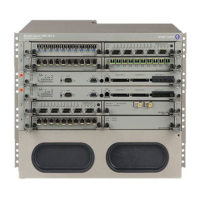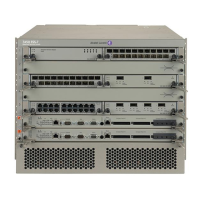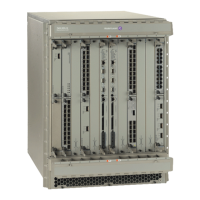VRRP Non-Owner Accessibility
386 Router Configuration Guide
When the host is unreachable, the host unreachable priority event is considered true or set.
When the host is reachable, the host unreachable priority event is considered false or cleared.
Route Unknown Priority Event
The route unknown priority event defines a task that monitors the existence of a given route
prefix in the system’s routing table.
The route monitoring task can be constrained by a condition that allows a prefix that is less
specific than the defined prefix to be considered as a match. The source protocol can be
defined to indicate the protocol the installed route must be populated from. To further define
match criteria when multiple instances of the route prefix exist, an optional next hop
parameter can be defined.
When a route prefix exists within the active route table that matches the defined match
criteria, the route unknown priority event is considered false or cleared. When a route prefix
does not exist within the active route table matching the defined criteria, the route unknown
priority event is considered true or set.
VRRP Non-Owner Accessibility
Although the RFC states that only VRRP owners can respond to ping and other management-
oriented protocols directed to the VRID IP addresses, the routers allow an override of this
restraint on a per VRRP virtual router instance basis.
Non-Owner Access Ping Reply
When non-owner access ping reply is enabled on a virtual router instance, ICMP echo request
messages destined to the non-owner virtual router instance IP addresses are not discarded at
the IP interface when operating in master mode. ICMP echo request messages are always
discarded in backup mode.
When non-owner access ping reply is disabled on a virtual router instance, ICMP echo
request messages destined to the non-owner virtual router instance IP addresses are silently
discarded in both the master and backup modes.

